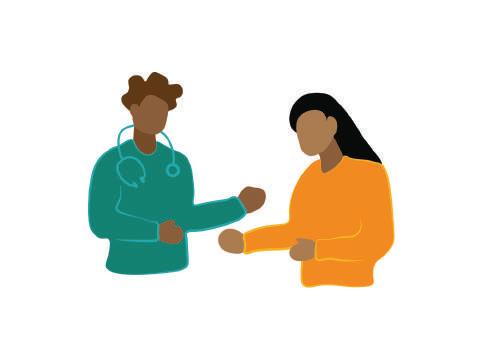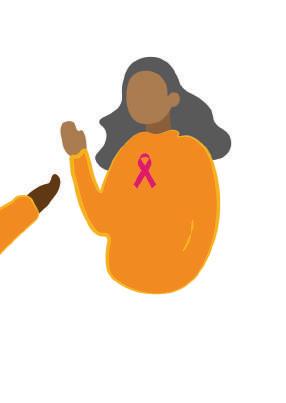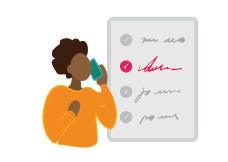HIV in the Workplace: A Guide for Employers and Employees























This guide is written for both employers and employees. The information included within will support employers to reduce HIV stigma, to raise awareness about HIV within the workplace, and to ensure that employees living with HIV are protected from discrimination. The guide will also help working people living with HIV to understand the rights and protection enshrined in The Equality Act 2010, and help them advocate for those rights if necessary.
People living with HIV contribute to workforces at all levels. Inclusive workplace policies and practices are essential to ensure that a person living with HIV is appropriately supported, can reach their full potential, and work free from discrimination.
Strengthening HIV awareness in the workplace and promoting key prevention messages can challenge stigma and contribute to better health and wellbeing outcomes for all employees.
In some professions, for example the armed forces and healthcare, guidance for people living with HIV is specific to the nature of the responsibilities of the role. This does not mean that people living with HIV cannot work in these areas. For more information on this visit nhs.uk/conditions/hiv-and-aids/living-with/ and George House Trust at ght.org.uk/node/193
HIV is a treatable and manageable health condition. A person living with HIV, who is on treatment, can expect to live a normal life span. HIV medication suppresses the amount of virus in the blood to ‘undetectable’ levels. When someone’s HIV is ‘undetectable’ this means it is also ‘untransmittable’. A person with undetectable levels of HIV cannot transmit HIV to their sexual partners. This is known as ‘Undetectable equals Untransmittable’, or U=U.
The ways in which HIV is transmitted mean that there is no risk of HIV being transmitted through day to day interactions between colleagues in the workplace.
A total of 91,432 people attended HIV care in England in 2021.�
1 https://www.gov.uk/government/statistics/hiv-annual-data-tables
HIV is protected under the Equality Act 2010 as a disability. This means that workplaces need to ensure that they do not discriminate against any employees living with HIV.
The Equality Act 2010 protects against six main types of disability discrimination:
→ direct discrimination
→ indirect discrimination
→ failure to make reasonable adjustments
→ discrimination arising from disability
→ harassment
→ victimisation
The Equality Act 2010 protects people living with HIV and covers areas such as recruitment and
confidentiality. It also places an obligation on employers to consider any requests for reasonable adjustments in the workplace. The Equality Act 2010 also protects people living with HIV against harassment and from being treated less favourably because of HIV status. This guide covers these areas.

The legislation says that employees should not be discriminated against:
→ because they are HIV positive (direct discrimination)
→ because someone thinks they are HIV positive (discrimination by perception)
→ because the person is connected to someone with HIV (discrimination by association)
If someone experiences any type of harassment related to HIV in the
workplace, it should be reported immediately.
Unlawful procedures may be reported to the Equality and Human Rights Commission which regulates compliance with the Equality Act, as well as to the Information Commissioner's Office (ICO) for UK GDPR personal data breach (DPA 2018).
If a person is unsure about whether they have experienced or witnessed discrimination or not, they can contact the Citizens Advice Bureau for advice. If the person is living in Greater Manchester or Liverpool, they can go directly to George House Trust.

An employee living with HIV is under no obligation to share a diagnosis of HIV. If an employee shares the fact of living with HIV it may be that this has been done in order to request a reasonable adjustment. It is important that requests for reasonable adjustments are considered fairly and in discussion with the employee.
If an employee shares the fact of living with HIV with their employer, the employer should ensure that this information remains confidential and that the employee feels safe and accepted.
Under the Equality Act 2010, an employer cannot share information about an employee’s HIV status without the explicit consent of the person concerned. If an employer feels that information about a person’s HIV status needs to be recorded, they should consider their reason for doing this.
This information must then be managed like any other confidential information, in accordance with the workplace’s data protection policy. How and where the information is stored should be considered, as well as who needs to know, and for how long the information should be retained. The employee should be informed about what information is being recorded and why.
The Equality Act 2010 gives people with HIV protection against discrimination in many aspects of employment, including during the recruitment process.
Job applicants are not required to share an HIV status at any stage of the recruitment, assessment or selection procedure. Candidates should only be asked about any disability in relation to the need to provide reasonable adjustments during the recruitment process or once they are in the post.

Employers or recruitment agencies are also not allowed to ask health related questions at interview, or to seek information about a person’s health from previous employers.

Reasonable adjustments are changes an employer makes to remove or reduce a disadvantage
related to a person’s disability. For example, making changes to the workplace, changing a person’s working arrangements, finding a different way to do something or providing equipment, services or support. Reasonable adjustments are specific to an individual.
There is no ‘set list’ of reasonable adjustments - an employer should take requests seriously and ensure that a discussion with the employee takes place before deciding whether the request being made is reasonable.
According to National AIDS Trust’s 2012 report HIV at Work, the most common requests for adjustments for people living with HIV are for time off to attend hospital and clinic appointments, flexibility in working hours, and the request to occasionally work from home. In most cases, these adjustments are inexpensive and easy to accommodate. These are examples of the types of reasonable adjustments people living with HIV may request; however, it is important to bear in
mind that there will be others. It is also important to bear in mind that business needs would need to be taken into consideration when granting such requests.2
Someone living with HIV will normally attend a clinic once every six months in order to ensure the effectiveness of medication and for routine blood tests.
The side effects of HIV medication are usually mild, though an employee may need support if starting treatment or switching from one medication to another. Each person’s reaction to medication is different, and it is therefore important to understand what support an employee may need by ensuring ongoing dialogue.
Employers should treat employees living with HIV the same as any other employee with a disability and therefore consider adjusting their sickness absence management procedures as a reasonable adjustment. This does not mean ignoring disability-related absences; it means agreeing a level of absence that is reasonable and acceptable to the organisation for the individual employee based on their individual circumstances (not all employees living with HIV will require the same level of absence). An employer should do this as they would for any other employee with
a condition covered by the Equality Act. An employer’s absence management policy should be clear on how disability-related absence will be managed.
It is good practice to ensure that information about reasonable adjustments and how to request them is made available to all staff at an early stage of their employment, thus providing reassurance that the employer understands their obligations and responsibilities.
All employers have a duty to ensure that employees living with HIV are not subject to discrimination. Employers who are aware of an employee’s HIV status must consider making reasonable adjustments to prevent any disadvantage in the workplace.
Where an employee's needs exceed the support offered through reasonable adjustments, an employee can consider the government’s Access to Work Scheme available at www.gov.uk. Access to work is employee-led and is instigated by the employee, not the employer.
Further information about reasonable adjustments can be found via the ACAS website (www.acas.org.uk).
HIV is a manageable health condition. Most people living with HIV take one or two pills per day and experience few or no side effects. People living with HIV and on treatment can expect to remain healthy and live a normal life span. There are no jobs in the UK that people living with HIV and on effective treatment cannot do.
However, HIV still attracts stigma unlike any other medical condition. One result of this is that people have outdated knowledge of what it is like to live with HIV.
Misinformation and misunderstanding can sometimes lead employers to think that people living with HIV require a significant amount of time off due to ill health. This is not true.
People may also think that a person living with HIV is a risk to them. This is also not true.
Misinformation can be dangerous, and lead to prejudice and discrimination.
HIV discrimination affects the emotional well-being and mental health of people living with HIV. People living with HIV often internalise the stigma they experience and begin to develop a negative self-image. They may fear they will be discriminated against or judged negatively for living with HIV.
A person can take in negative ideas and stereotypes about people living with HIV and start to apply them to themselves. This is called ‘internalised stigma’ and can lead to feelings of shame, isolation, and despair.


HIV stigma in the workplace can be extremely damaging.
Employers are required by law to ensure that HIV stigma in the workplace is challenged and that people living with HIV are able to work free from discrimination.
However, employees also have an important role to play in ending HIV stigma. Employees can contribute to an atmosphere of prejudice and discrimination, or they can take action to ensure that their colleagues are supported.
Both employers and employees can take action to end HIV stigma by:
→ Organising or requesting an HIV awareness training session (contact the PaSH Partnership for the most up to date information at gmpash.org.uk)
→ Reading and sharing this guide with colleagues
→ Committing to telling at least five people this year that U=U
→ Asking the Equality and Inclusion Lead or their equivalent (if applicable) to consider how to create an HIV friendly workspace
→ Marking World AIDS Day every year on 1st December
→ Visiting gmpash.org.uk to learn more about HIV and sexual health
→ Taking action if they witness or experience stigmatising attitudes or discriminatory behaviour by reporting it to HR or to management. If this behaviour stems from management, it can be reported to the Equality and
Human Rights Commission which regulates compliance with the Equality Act.
Employers and employees can do more by accessing further training and proactively raising awareness about HIV. They can also ensure they are supportive and non-judgemental to a colleague living with HIV at work.
We believe that HIV awareness training should be provided to all employees as part of their induction process. If an employee feels their workplace could be doing more to raise awareness of HIV, they can express these views to their manager.
George House Trust offers HIV Awareness Training through their Positive Speakers programme that can be tailored to an organisation’s needs. Their courses will:
→ increase awareness of HIV
→ equip a workplace to challenge stigma and prejudice
→ improve the quality of services provided to people who may be living with HIV

→ Email training@ght.org.uk or call 0161 274 4499
George House Trust also provides a useful HIV Language Guide which challenges the everyday stigmatisation of HIV through language, and supports people living with HIV. This can be found at www.ght.org.uk.
P has been living with HIV since 2005. She has accessed support through George House Trust since that time and has slowly regained self-confidence. Her partners have all been accepting and understand that P’s medication means that the HIV is untransmittable. However, someone at P’s workplace has found out about her HIV status and has told other colleagues, some of whom have started to ignore her.
P has overheard one of her colleagues describe her as ‘riddled with disease’. P tried to speak to her manager but was told to ‘ignore them’ and get on with her work. P feels like an outcast in the workplace where she has been employed for five years and is looking for alternative employment. She feels pushed out by her colleagues and her manager and has started to lose her regained self-confidence because of this experience.
These case studies detail examples of real-life HIV discrimination within the workplace. What’s the best advice and plan of action for the employee and the employer in each situation?
S was shocked to receive a diagnosis of HIV as she has always associated the virus with gay men and it was never something she felt she needed to be aware of. She works in a health organisation and feels angry that she has never had any training around HIV. S also feels isolated because her colleagues don’t seem aware of HIV, and it feels like too big a conversation to have to start on her own. S has tried to talk to her manager about bringing in someone to provide HIV awareness training, but her manager doesn’t think it is a priority because “HIV is a thing from the past”. S feels like she isn’t being listened to and her manager’s response has made her start to feel very depressed about her own diagnosis.
J was recently diagnosed with HIV. As a former medical student, he already knew a lot about HIV and HIV medication and his diagnosis did not impact him particularly severely. However, once J started his medication, he needed to take some time off work because of side effects. J’s continued nausea means that he is considering switching his medication, but he’s nervous about making things worse at work. J doesn’t feel confident about talking about this with his manager because it feels personal and hypothetical, and his manager may think it a waste of time. Though J feels confident about his own HIV knowledge, he doesn’t know how his manager will react. He knows that his workplace has never marked World AIDS Day, nor provided any HIV awareness training.
HIV stands for Human Immunodeficiency Virus and is a virus that attacks cells in the immune system (the body’s natural defence against illness). HIV is now a treatable and manageable health condition.


The most common way of acquiring HIV in the UK is through having anal or vaginal sex without a condom.
Other ways of getting HIV include sharing needles, syringes or other injecting equipment; perinatally; or through breastfeeding.
• HIV is found in:
• semen (cum)
• vaginal and anal fluids
• blood
• the breast milk of someone living with HIV
HIV cannot be transmitted through sweat, urine, or saliva. In other words, HIV cannot be transmitted by kissing, touching, hugging, or sharing utensils.
Using a condom during sex is an effective way to prevent the transmission of HIV and STIs.
Another prevention method is PrEP (Pre-Exposure Prophylaxis) which is a pill that can be taken to protect against HIV. PrEP is freely available from the NHS or can be bought from iwantprepnow.co.uk. However, please note that PrEP protects against HIV but does not prevent other STIs such as chlamydia or gonorrhoea.
If someone is worried that they have been exposed to HIV, PEP (Post Exposure Prophylaxis) can be taken within 72 hours. The person worried about exposure should contact their local sexual health clinic and arrange an emergency appointment. PEP is a 28-day course of HIV treatment that can protect someone from contracting HIV after exposure to it.

Someone living with HIV, who is on treatment, can live a long, healthy life. HIV medication suppresses the amount of virus in the blood to ‘undetectable’ levels. This does not mean that HIV is not present. When someone’s HIV is ‘undetectable’ this means it is also ‘untransmittable’ to a sexual partner. This is known as U=U (undetectable = untransmittable). Therefore, someone living with HIV and taking medication cannot pass HIV to a sexual partner.
Self-sampling kits to test for HIV are available, free of charge, from www.freetesting.hiv

Find your nearest sexual health clinic

www.nhs.uk/service-search/find-a-sexual-health-clinic/
Book an HIV/STI test in a community setting with BHA for Equality by visiting www.thebha.org.uk or with LGBT Foundation by visiting www.lgbt.foundation
BHA for Equality (part of the PaSH Partnership) offers awareness sessions and training on a broad range of sexual and relationship health topics. For more information email pash@thebha.org.uk
Equality Act 2010:
www.legislation.gov.uk/ukpga/2010/15/contents
www.gov.uk/guidance/equality-act-2010-guidance
UNAIDS, HIV and Stigma and Discrimination –Human rights fact sheets series, 2021:
www.acas.org.uk/reasonable-adjustments/asking-for-reasonable-adjustments
National AIDS Trust – HIV at Work:
www.nat.org.uk/sites/default/files/publications/Jul_2012_HIV%40Work_ Advice_for_employers_0.pdf
Access to Work Guide for Employees:
www.gov.uk/government/publications/access-to-work-guide-for-employers
George House Trust guide to inclusive HIV language: ght.org.uk/sites/ght.org.uk/files/sites/default/files/civicrm/custom/979/ hiv-language-guide.pdf
NHS’ guide to Occupational Health: https://www.nhshealthatwork.co.uk/what-is-oh.asp
GMPASH
Information on sexual health
https://gmpash.org.uk
BHA for Equality
Advice, support, and health information for ethnic minoritized communities
www.thebha.org.uk
George House Trust
Advice, support, and information for people living with HIV
www.ght.org.uk
LGBT Foundation
Advice, support, and information for LGBTQI
www.lgbtfoundation
Sexual Health Clinics
Find your nearest sexual health service
www.nhs.uk/service-search/ sexual-health
SexWise
Information on Sexually Transmitted Infections
www.sexwise.org.uk
Nam AIDS Map
For up-to-date news reports, research, and information regarding HIV treatment, prevention, and services
https://www.aidsmap.com
Equality and Human Rights Commission
Advice and guidance on Equality and Human rights
www.equalityhumanrights.com
Equality Advisory & Support Service
Advice, support, and Information on issues relating to equality and human rights
www.equalityadvisoryservice.com
Advisory, Conciliation and Arbitration Service
Free and impartial advice to employers, employees, and their representatives on employment rights, best practices, and policies, and resolving workplace conflict
www.acas.org.uk
The Trade Union Congress
The TUC works closely with affiliated unions to make sure the voice of North West workers are heard in the workplace, in the communities and in wider society
www.tuc.org.uk/north-west










The Passionate about Sexual Health Partnership (PaSH Partnership) is a collaboration between BHA for Equality, George House Trust, and the LGBT Foundation.
The PaSH Partnership delivers a comprehensive programme of interventions to meet the changing needs of people newly diagnosed with HIV, living longer term with HIV, or at greatest risk of acquiring HIV.

Illustrations by Shilvan da Costa
Content produced by BHA for Equality
Design by Jennifer Corcoran 27eleven.co.uk
Published June 2023